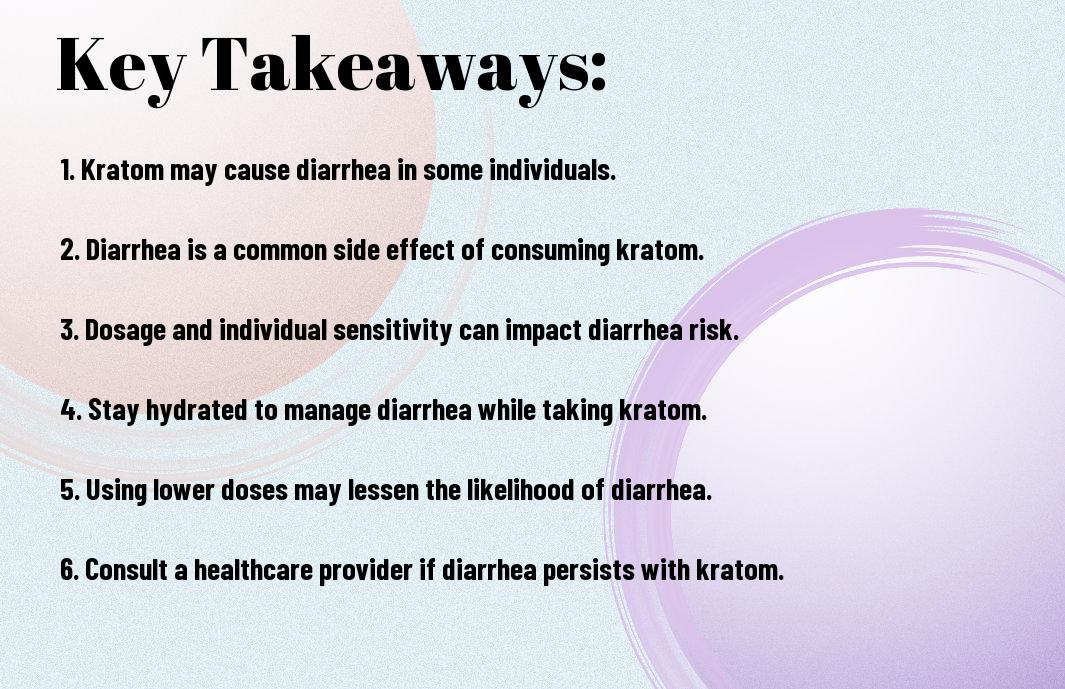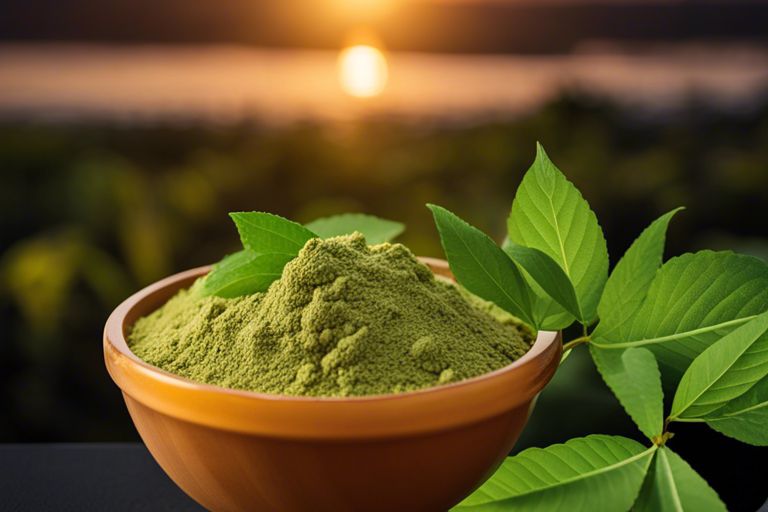Many have wondered about the potential gastrointestinal effects of consuming kratom. In this informative piece, we explore into the relationship between kratom and diarrhea, exploring the possible causes, risks, and factors to consider. Understanding these dynamics can empower users to make informed decisions about their kratom consumption and overall well-being. Stay tuned for a comprehensive analysis of the connection between kratom and diarrhea.
Key Takeaways:
- Kratom may cause diarrhea: Some individuals may experience diarrhea as a side effect of using kratom, especially at higher doses. It is vital to monitor your dosage and consult with a healthcare professional if you experience persistent diarrhea.
- Other factors to consider: Diarrhea can also be influenced by various factors such as individual tolerance, diet, hydration levels, and underlying health conditions. It is crucial to consider these factors when experiencing gastrointestinal issues related to kratom use.
- Manage kratom use responsibly: To minimize the risk of diarrhea and other potential side effects, it is important to use kratom responsibly, follow recommended dosages, stay hydrated, maintain a balanced diet, and listen to your body’s signals. If diarrhea persists or worsens, seek medical advice promptly.

What is Kratom?
Your journey into understanding the effects of kratom on the body begins with a closer look at what kratom is. Kratom, scientifically known as Mitragyna speciosa, is a tropical evergreen tree native to Southeast Asia. The leaves of the kratom tree contain compounds that have psychotropic (mind-altering) effects, which have made it a popular choice for recreational and medicinal use.
Origin and History
One of the crucial aspects of kratom is its rich history rooted in the Southeast Asian region. For centuries, indigenous communities in countries like Thailand, Malaysia, and Indonesia have utilized kratom leaves for their stimulant and pain-relieving properties. Traditionally, kratom was often chewed or brewed into tea to combat fatigue and increase productivity among laborers.
Chemical Composition
Originating from the coffee family, kratom contains two primary compounds, mitragynine, and 7-hydroxymitragynine, which interact with opioid receptors in the brain to produce varying effects. These compounds are known for their analgesic (pain-relieving) and stimulating properties, which have led to kratom’s popularity in managing chronic pain and boosting energy levels.
For instance, mitragynine acts as a partial agonist at the mu-opioid receptors, similar to how opioids work in the body. However, the danger lies in its potential for addiction and dependence, as prolonged use can lead to withdrawal symptoms and adverse effects on the liver and kidneys.
The Effects of Kratom on the Body
Stimulation and Euphoria
Body of research indicates that kratom, when consumed in moderate doses, can lead to stimulation and euphoria. This is due to the active compounds in kratom, such as mitragynine and 7-hydroxymitragynine, which interact with the brain’s opioid receptors. Users might experience increased energy, alertness, and a sense of well-being after consuming kratom.
Sedation and Relaxation
Euphoria induced by kratom is often followed by a sense of sedation and relaxation. This calming effect is desirable for individuals seeking relief from anxiety, stress, or chronic pain. Kratom can act as a natural alternative to pharmaceutical sedatives or painkillers, which may carry more risks of addiction and side effects.
With the proper dosage and strain selection, kratom users can find the right balance between stimulation and sedation based on their needs and preferences.
Digestive System Impact
With its complex interactions with the body, kratom can also affect the digestive system. Some users report improved digestion and relief from gastrointestinal issues after consuming kratom. On the other hand, others may experience digestive discomfort, such as constipation or diarrhea, as a side effect of kratom use.
The digestive system is particularly sensitive to kratom’s effects, and individuals should monitor their body’s response and make adjustments as needed to prevent any adverse reactions.
Systematic investigation into the potential benefits and risks of kratom consumption is important to fully understand its impact on the body and inform safe usage practices.
Diarrhea and Kratom: Is There a Connection?
User Reports and Anecdotal Evidence
To many users, Kratom is prized for its potential health benefits, including pain relief, mood enhancement, and increased energy. However, some individuals have reported diarrhea as a side effect of consuming this herbal supplement. The experiences shared by users suggest a potential link between Kratom consumption and gastrointestinal disturbances.
Scientific Studies and Research Findings
Any concrete evidence linking Kratom specifically to causing diarrhea remains scarce in peer-reviewed research. While anecdotal reports are abundant, scientific studies exploring this potential connection are limited and inconclusive.
Further studies are warranted to investigate the relationship between Kratom use and digestive issues. With the current body of scientific research being insufficient, it is challenging to definitively attribute diarrhea to Kratom use.
Possible Mechanisms Behind Kratom-Induced Diarrhea
Studies suggest that certain alkaloids present in Kratom may interact with the digestive system, potentially leading to gastrointestinal distress in some individuals. These alkaloids may disrupt the balance of gut flora or stimulate intestinal motility, contributing to symptoms like diarrhea.
The potential mechanisms driving Kratom-induced diarrhea are complex and multifaceted, requiring further research to fully understand the interplay between Kratom consumption and gastrointestinal effects.
Factors That May Contribute to Kratom-Related Diarrhea
Despite kratom being lauded for its potential benefits, there are certain factors that may contribute to kratom-related diarrhea. These factors include:
- Dosage and Frequency of Use: That individuals who take high doses of kratom frequently may be more prone to experiencing digestive issues such as diarrhea. Any Multi-State Salmonella Linked to Kratom Supplements outbreak can worsen these symptoms.
- Individual Tolerance and Sensitivity: An individual’s unique biochemistry and tolerance to kratom can play a significant role in whether they experience gastrointestinal distress, such as diarrhea.
Dosage and Frequency of Use
That individuals who consume kratom in high doses on a regular basis may stress their digestive system, leading to potential issues like diarrhea. Consistent use at elevated levels can disrupt the digestive process and result in gastrointestinal discomfort. Monitoring kratom intake and being aware of safe dosage guidelines is crucial to avoid unpleasant side effects.
Individual Tolerance and Sensitivity
An individual’s unique sensitivity to kratom can greatly impact their likelihood of experiencing digestive problems such as diarrhea. With kratom, as with any substance, some individuals may be more prone to adverse reactions based on their body chemistry. It is vital to start with small doses and gradually increase consumption to assess individual tolerance levels and minimize the risk of gastrointestinal issues.
Interactions with Other Substances
Tolerance to kratom can be influenced by the simultaneous use of other substances. Mixing kratom with certain medications or substances like alcohol can exacerbate digestive problems and increase the chances of experiencing diarrhea. To avoid potential complications, it is important to be mindful of all substances being consumed concurrently with kratom and consult with a healthcare professional if necessary.

Managing Diarrhea Caused by Kratom
Hydration and Electrolyte Balance
Hydration is crucial when managing diarrhea caused by kratom. Diarrhea can lead to dehydration, so it’s important to drink plenty of fluids to replace lost fluids. Water, clear broths, and electrolyte-rich drinks can help keep you hydrated. Additionally, maintaining electrolyte balance with drinks that contain potassium and sodium can help replenish what your body loses during bouts of diarrhea.
Dietary Changes and Gut Health
Health is key when it comes to managing diarrhea from kratom. Foods high in fiber, such as bananas, applesauce, and oats, can help bulk up your stool and alleviate diarrhea symptoms. Probiotic-rich foods like yogurt can also help promote gut health, restoring balance to your digestive system.
For instance, avoiding spicy foods, dairy, and fatty foods can help reduce irritation in the gut and further alleviate diarrhea symptoms.
Over-the-Counter Medications and Supplements
Supplements such as loperamide can help manage diarrhea symptoms caused by kratom. These medications can help slow down bowel movements and provide relief from frequent trips to the bathroom. It’s important to consult with a healthcare provider before taking any over-the-counter medications to ensure they are safe and appropriate for your situation.
Balance, it’s important to note that overusing medications like loperamide can lead to constipation and other complications. Always follow the recommended dosage and use medicinal aids as directed to avoid any adverse effects.
Can Kratom Cause Digestive Issues?
Yes, kratom can cause digestive issues such as constipation. This is one of the known kratom and constipation effects. It is important to be aware of this potential side effect and to monitor how your body responds to the use of kratom.
Alternatives to Kratom for Pain Relief and Energy
All-natural remedies and herbal options can provide a gentler alternative to kratom for pain relief and energy.
Natural Remedies and Herbal Options
Many people turn to herbs like turmeric, ginger, and white willow bark for their anti-inflammatory properties, which can help alleviate pain. Additionally, supplements like ashwagandha and ginseng are known for their energy-boosting effects without the risk of dependency associated with kratom.
Any pharmaceutical alternatives may also be considered for managing pain and boosting energy levels.
Pharmaceutical Alternatives
Over-the-counter medications such as ibuprofen or acetaminophen can help with pain, while prescription medications like gabapentin or tramadol may be prescribed for chronic pain conditions. Pertaining to energy, medications like modafinil can provide a boost without the potential risks of kratom.
Natural pharmaceutical alternatives offer a mix of traditional and modern approaches to pain management and energy enhancement. A balanced combination of natural remedies and prescription medications can provide effective relief without the potential side effects of kratom misuse.
A variety of lifestyle changes and holistic approaches can also contribute to pain relief and increased energy levels.
Lifestyle Changes and Holistic Approaches
Incorporating regular exercise, mindfulness practices like yoga or meditation, and maintaining a healthy diet can all contribute to overall well-being. Additionally, acupuncture and massage therapy are alternative treatments that can help alleviate pain and promote relaxation.
Options for lifestyle changes and holistic approaches offer a sustainable and long-term solution for managing pain and improving energy levels. By addressing the root causes of discomfort and fatigue, individuals can achieve lasting relief and vitality.
Energy fluctuations and pain management are crucial aspects of daily life, and exploring a range of alternatives can help individuals find the most suitable and sustainable solutions for their well-being.
Final Words
Presently, based on the information provided in the article and various sources, it seems plausible that kratom can cause diarrhea. While further research may be needed to fully understand the extent of this effect, it is imperative for individuals using kratom to be aware of potential side effects, including diarrhea. For more information on the risks associated with kratom use, please refer to the Mayo Clinic article Kratom: Unsafe and ineffective.
FAQ
Q: What is kratom?
A: Kratom is a tropical tree native to Southeast Asia, known for its medicinal properties and recreational use.
Q: Does kratom cause diarrhea?
A: While kratom is known to have some side effects, including diarrhea, it doesn’t affect everyone in the same way.
Q: What can cause diarrhea when taking kratom?
A: Diarrhea from kratom can be caused by various factors, such as dosage, individual sensitivity, or the quality of the product.
Q: How can you prevent diarrhea when taking kratom?
A: To minimize the risk of diarrhea when using kratom, it’s necessary to start with a low dose, stay hydrated, and choose a reputable source for your kratom products.
Q: When should I seek medical help for diarrhea related to kratom use?
A: If you experience severe or prolonged diarrhea after taking kratom, it’s important to consult a healthcare professional to rule out any underlying issues.










